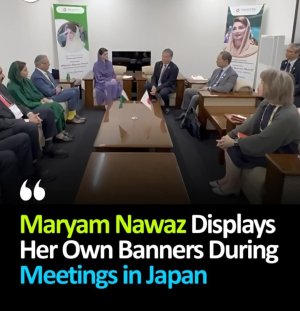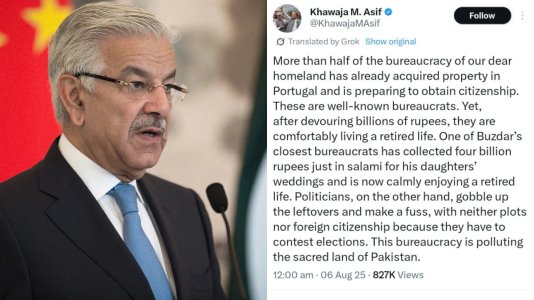For those crying OP was fake news
====
Maryam Nawaz’s Japan Delegation And The Debate On Governance Priorities
When Chief Minister Maryam Nawaz embarked on her much-hyped trip to Japan this August, the announcement was grand: Punjab was on its way to international partnerships, to global recognition, to a future shaped by “world-class” expertise. By the time the first photos and invoices surfaced, the visit appeared more ceremonial than diplomatic.
The numbers alone tell their own story. The government allocated Rs. 160 million for the visit, already bloated from the original Rs. 100 million estimate. This was money drawn from a provincial exchequer where farmers cannot sell their crops, industries stand shuttered, and public hospitals run out of basic medicines. Yet instead of subsidies, medicines, or roads, Punjab’s resources were redirected to luxury hotels and fleets of expensive vehicles.
The spending was accompanied by a major publicity drive, with TV commercials and half-page newspaper adverts appearing before the Chief Minister had even concluded her first meeting. Development, it appeared, had already been achieved through the magic of marketing. For ordinary families struggling with food inflation and school fees, this was not inspiration, it was a mockery.
The promises made in Tokyo, too, carried the unmistakable air of unreality. Lahore, we were told, would be transformed into a “world-class city” by learning from Yokohama. The sentiment is noble, but the comparison collapses under arithmetic. Yokohama spends $8.5 billion every year just on waste management. This is nearly half of Punjab’s entire provincial budget. Without major investments or binding agreements, these promises were little more than slogans wrapped in diplomatic packaging.
Maryam Nawaz’s defenders argue that such visits are necessary, that international engagement is part of governance
The images from the visit did little to address the criticism. Far from projecting Punjab as an emerging hub of investment, the optics suggested staged photos and carefully managed publicity. For citizens watching from Lahore or Gujrat, where broken roads and untreated sewage define daily life, the spectacle felt not just irrelevant but insulting.
It was inevitable that the comparisons would follow. PTI leaders were quick to remind the public of their own leaner, businesslike trips abroad: commercial flights, one-on-one meetings, and tangible outcomes. One can debate PTI’s governance record, but in this area the contrast is undeniable: substance versus spectacle, outcomes versus optics. The government may dismiss these reminders as political point-scoring, but the people of Punjab are capable of drawing their own conclusions.
The greatest tragedy, of course, lies in the opportunity cost. The Rs. 160 million spent on this trip could have stocked government hospitals with medicines, funded sanitation projects in Lahore to stop the spread of cholera and dengue, or provided subsidies to struggling farmers. It could have repaired roads, reopened ginning mills, or provided scholarships for young people desperate for opportunities. Instead, it was poured into luxury hotels and glossy adverts. Punjabis paid the bill and got hashtags in return.
Maryam Nawaz’s defenders argue that such visits are necessary, that international engagement is part of governance. They are right in principle, but wrong in practice. Diplomacy must be purposeful, lean, and productive. It must deliver results, not Instagram posts. And it must certainly not drown the province in publicity campaigns before a single deal is signed.
The Japan trip, for all its expense and spectacle, delivered nothing that ordinary Punjabis could feel or see. No contracts, no timelines, no investments. Only promises that have become as familiar as they are empty. Punjab does not need another round of slogans. It needs functioning hospitals, schools that actually teach, clean water in villages, medicines in clinics, and jobs for its young. It needs rulers who understand that governance is not measured by advertising or stage-managed publicity.
The visit was billed as Punjab’s leap into the future. In reality, it has become a symbol of everything wrong with the present: a government more obsessed with optics than outcomes, more interested in advertisements than accountability. The betrayal lies not in the expenditure alone, but in the refusal to see that Punjab deserves better.
Until its leaders learn that legitimacy is built in hospitals and classrooms, not in staged publicity abroad, Punjab will remain stuck in its tragic cycle: promises made abroad, poverty endured at home. The people of Punjab do not need “historic visits.” They need honest governance. They need results. And above all, they need relief from the politics of spectacle.
Maryam Nawaz’s Japan visit drew attention for its high costs, bold promises, and questions over what it delivered for Punjab at home

www.thefridaytimes.com



 www.nation.com.pk
www.nation.com.pk











